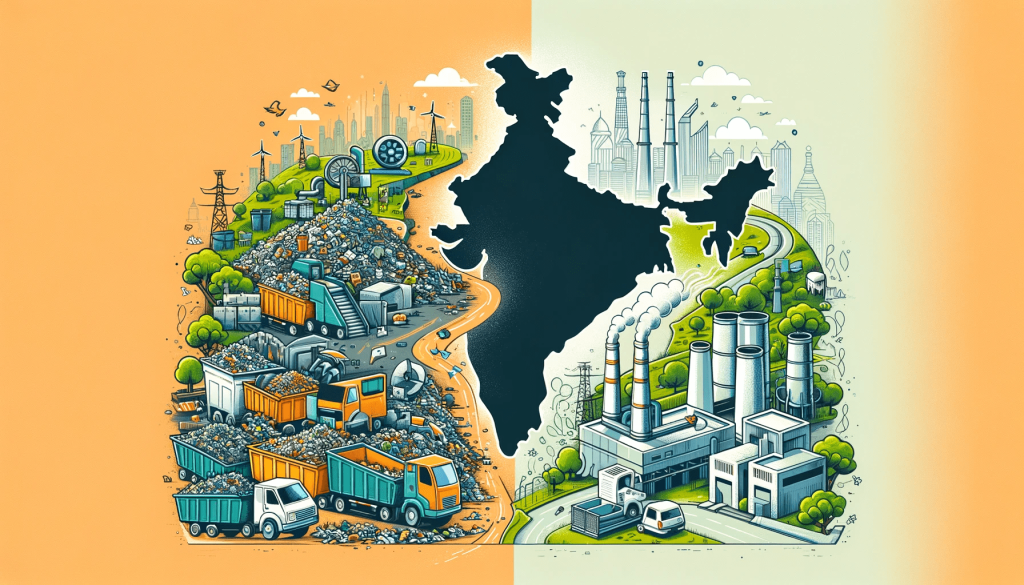
Introduction to Waste-to-Energy in India
India, a country grappling with the challenges of rapid urbanization and escalating waste volumes, is turning its attention to an innovative solution: Waste-to-Energy (WtE). This approach, pivotal in addressing the burgeoning waste management crisis, has gained significant traction in recent years. The essence of WtE lies in its dual objective: managing the colossal waste generated daily in Indian cities and harnessing it as a resource for energy generation.
The evolution of WtE in India marks a critical shift in the nation’s approach to waste management. From traditional methods of landfilling and composting, there’s a steady move towards more sustainable and technologically advanced processes. This shift is propelled by a combination of factors: mounting environmental concerns, the escalating volume of municipal solid waste (MSW), and the pressing need for renewable energy sources.
This article aims to shed light on India’s journey in transforming waste into a treasure trove of energy. We will delve into the current landscape of MSW management, explore the technological innovations driving this transition, and assess the environmental and economic impacts of these initiatives. Furthermore, we will navigate through the challenges encountered and envision the future trajectory of WtE in India.
The Current Landscape of Municipal Solid Waste Management
The landscape of municipal solid waste management in India is at a pivotal juncture. As one of the fastest-growing economies, India faces an escalating challenge with waste management. Urban centers, burgeoning with population, produce a staggering amount of waste daily. Recent statistics reveal that Indian cities generate over 150,000 tonnes of municipal solid waste per day, a number only set to rise with urbanization.
The traditional methods of dealing with this waste, primarily through landfilling, have proven to be unsustainable. Landfills in major cities are reaching their capacity, posing serious environmental and health risks. This situation underscores the urgent need for effective waste management solutions. While recycling and composting initiatives have made some headway, they fall short of addressing the sheer scale of waste generated. The gap between waste production and effective management is a critical issue that India must address to ensure sustainable urban development.
Key Statistics and Facts
The statistics surrounding municipal solid waste (MSW) in India paint a compelling picture of the urgent need for effective waste management solutions. Each day, Indian cities collectively generate an astonishing volume of waste, estimated to be over 150,000 tonnes. This number is expected to soar as the urban population continues to grow rapidly. The recycling rate, though improving, still lags significantly behind the generation rate. The potential for energy production from this vast amount of waste is enormous, yet currently underutilized. Converting even a fraction of this MSW into energy could substantially contribute to India’s renewable energy portfolio.
Technological Innovations in Waste-to-Energy
The Waste-to-Energy (WtE) sector in India is witnessing a surge of technological innovations, pivotal in transforming the nation’s approach to waste management. These technologies are diverse, ranging from incineration, which burns waste to generate electricity, to more advanced methods like gasification and anaerobic digestion.
Incineration, one of the more traditional methods, has been upgraded with modern pollution control technologies to minimize its environmental impact. Gasification, a relatively newer technology, converts organic materials into synthetic gas (syngas) under high temperatures. This syngas is then used to generate electricity, offering a more efficient and cleaner alternative to direct combustion.
Anaerobic digestion, another promising technology, involves the breakdown of organic waste in the absence of oxygen, producing biogas that can be used for heating or electricity generation. This technology not only provides a renewable source of energy but also produces a nutrient-rich digestate that can be used as a fertilizer.
Each of these technologies offers unique benefits and challenges, but collectively, they represent a significant leap forward in India’s ability to manage waste more sustainably and extract valuable energy resources.
Case Study: Indore’s GOBARdhan Plant
A testament to India’s commitment to innovative waste management solutions is the GOBARdhan plant in Indore. Inaugurated in 2022, it stands as Asia’s largest municipal solid waste-based plant, designed to process organic waste into bio-CNG. With a capacity to handle hundreds of tonnes of organic waste daily, the plant aims to generate around 19,000 kg of bio-CNG gas, setting a benchmark in the waste-to-energy domain.
This facility is not just a marvel of engineering but also a symbol of Indore’s transformation in waste management. It underscores the potential of such initiatives in revolutionizing the way cities handle waste, moving towards a more sustainable and circular approach to resource utilization.
Bio-CNG and Bio-Methanation Technologies
Bio-CNG and bio-methanation technologies are at the forefront of India’s waste-to-energy initiatives. Bio-CNG, derived from the bio-methanation of organic waste, offers a cleaner alternative to conventional fossil fuels. Bio-methanation, a process of decomposing organic matter anaerobically to produce methane-rich biogas, is increasingly being adopted in urban waste management.
These technologies not only provide a renewable source of energy but also significantly reduce the volume of waste that ends up in landfills. By converting organic waste into valuable energy resources, these technologies embody the principles of a circular economy, where waste is not an end-product but a resource to be harnessed.
Environmental and Economic Impacts
The environmental and economic impacts of waste-to-energy projects in India are profound. Environmentally, these projects offer a sustainable solution to the mounting waste problem. By diverting waste from landfills, they reduce methane emissions, a potent greenhouse gas, and minimize the risk of groundwater contamination and other environmental hazards associated with landfills.
Economically, waste-to-energy projects contribute significantly to local economies. They create new jobs in plant operation and maintenance, as well as in the supply chain for waste collection and processing. The energy generated from these plants contributes to the national grid, reducing dependence on fossil fuels and promoting renewable energy sources.
Additionally, these projects can generate revenue through the sale of electricity and reduce the financial burden on municipalities for waste management. The overall economic benefits extend beyond immediate financial gains, contributing to the development of sustainable urban infrastructures and improving the quality of life in cities.
Challenges and Future Directions
Despite the promising potential of waste-to-energy projects, India faces several challenges in scaling up these initiatives. One of the primary challenges is the high initial investment and operational costs. Securing funding and managing the financial sustainability of these projects remains a hurdle.
Another challenge is the technological aspect. While there has been significant progress, further research and development are needed to enhance efficiency and reduce environmental impacts. Public acceptance is also crucial, as misconceptions about waste-to-energy technologies can lead to resistance from local communities.
Looking forward, India’s future in waste-to-energy looks optimistic. With continued government support, public-private partnerships, and advancements in technology, the potential for these projects to significantly contribute to sustainable waste management and energy generation is immense. The focus should be on developing cost-effective, environmentally friendly technologies and creating robust policies that support the growth and scalability of the waste-to-energy sector.




 Our specialty focus areas include
Our specialty focus areas include 



